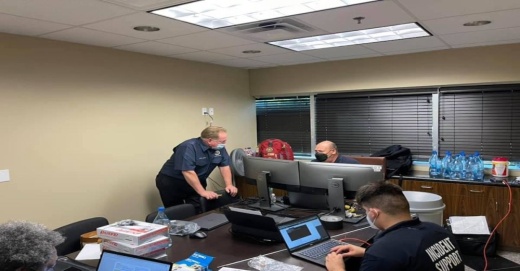A shift in federal distribution policy of monoclonal antibody therapeutic drugs has led to a shortage of the drug at regional infusion sites in Texas, including one in Montgomery County which opened in August.
According to the Texas Department of State Health Services, providers were once able to order the drugs directly from a wholesale distributor. Now, they must receive allocations from their states, who in turn will receive them from the federal government. The U.S. Department of Health and Human Services, which is responsible for allocating the drugs, says the change comes due to increased demand.
DSHS said following the federal change, Texas received 21,270 courses of drugs intended for a time period just over a week, compared to 27,811 courses that providers ordered from Sept. 1-10.
County Judge Mark Keough posted about the change late on Sept. 14 on Facebook. Keough said he believes the White House was “metering” supply of Regeneron to Texas and Montgomery County, and alleged the national supplies are “ample.”
“So less than a week after [President Joe Biden] tells us his patience is wearing thin and he is mandating vaccines to millions of Americans his administration limits and all but removes a noncontroversial and highly successful treatment from our war chest of combating this virus,” Keough wrote.
The Regeneron treatment used at sites in Montgomery County and elsewhere in Texas received a Food and Drug Administration emergency use authorization in November. Montgomery County’s site, based near Woodforest Bank Stadium in Shenandoah, is one of nine that DSHS opened across Texas in August. Over 140 providers statewide are also administering the treatment.
Therapeutic drugs are used to treat patients who have tested positive for COVID-19 with mild or little symptoms. DSHS officials said to use receive treatment, patients must have a physician’s approval. Following Gov. Greg Abbott’s positive COVID-19 test in August, he was one of the recipients of the treatment. In addition to Regeneron, other approved drugs include Bamlanivimab and Etesevimab.
Demand driving policy changes
Chris Van Deusen, the director of media relations at DSHS, confirmed a change in the process of distributing COVID-19 therapeutic drugs on the federal end to Community Impact Newspaper. Van Deusen said DSHS was notified of the change Sept. 13 by the U.S. Health and Human Services Department.
“For the last several months, providers have been able to order directly from the distributor, but demand is now exceeding supply, so the feds are changing that process,” Van Deusen wrote in an email.
According to Van Deusen, DSHS sent out a statement to all providers of COVID-19 therapeutics on Sept. 14, informing them the state would now be distributing medicine. Van Deusen confirmed 24,924 people received treatment at a state-operated center through Sept. 14. Keough’s Facebook post said over 2,000 people had been treated at the Montgomery County center.
Van Deusen said DSHS would be reallocating supplies across state-run centers to make sure they could operate until the next federal shipment of drugs arrived. Keough confirmed the Montgomery County center would be able to operate, but cautioned that it would be on a “day-by-day” basis.
"The state has come through in a huge way to ensure our infusion site can reopen in the morning under normal operating procedures and times," Keough wrote on Facebook.
HHS spokesperson Kirsten Allen said the change was sparked by an increased demand for the drugs. Allen said seven states were making up 70% of demand, but declined to say whether Texas was included or the identities of any of the states.
“Given this reality, we must work to ensure our supply of these life-saving therapies remains available for all states and territories, not just some,” Allen wrote in an email.
Biden discussed the drugs in his address Sept. 9, where he said the distribution would increase. Allen said in early August, the federal government was distributing an average of 100,000 doses a week, and that number increased to 150,000 by the end of the month.
Distribution based on cases, hospitalizations
Allen shared HHS’ formula for determining how many doses states get. HHS will first determine a state or territory’s proportion of the country’s total COVID-19 hospitalizations and confirmed cases, using a weighted average of these two numbers.
This percentage is equal to that state or territory’s portion of the total amount of monoclonal antibody products available for a given distribution week, Allen said.
Amounts may be reduced if a state or territory’s projected utilization is less than their calculated amount. Allen said use of the drugs is reported each week to HHS by administration sites, health departments or other entities.
“This system will help maintain equitable distribution, both geographically and temporally, across the country—providing states and territories with consistent, fairly-distributed supply over the coming weeks,” Allen said.
When asked what providers should do if they face a shortage, Van Deusen said they should match patients to the treatments they have on hand.
"We're going to provide all the treatment courses we get from the feds each week," Van Deusen said.





